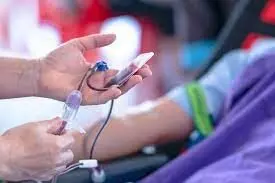
Blood tests taken on the day of brain injury can predict death: study
text_fieldsNew York: Medical practitioners now may not have to wait long to know the fate of a patient who suffered from brain injury. A new study has found that blood tests taken on the day of a traumatic brain injury can predict the chances of death and survival.
Clinicians can also get an idea about the possibility of severe disability as the result of brain injury which will help them make decisions about possible treatments in advance.
Findings of the study held at the University of Michigan suggest two protein biomarkers in the blood - GFAP and UCH-L1. The higher values of these are linked to death and severe injury. Scientists measured the proteins using two devices and analyzed day-of-injury blood tests of nearly 1,700 patients.
The results of the blood tests were compared to evaluations made six months after injury. The Glasgow Outcome Scale-Extended, a system that grades the functional status of TBI patients was used to assess the status of patients.
When compared with those with GFAP values in the bottom 20th percentile, patients with GFAP values in the top 20th percentile had a 23 times higher risk of death. In the case of UCH-L1, patients in the top 20th percentile had a 63 times higher risk of death than those in the bottom 20th percentile.
The US Food and Drug Administration (FDA) cleared the use of GFAP and UCH-L1 in 2018.
Researcher Frederick Korley said the early and accurate prediction of TBI outcomes will help clinicians gauge how severe a brain injury is and inform how best to counsel family members about care for their loved ones with brain injury and what to expect with regards to their recovery.
The study is published in The Lancet Neurology.
























